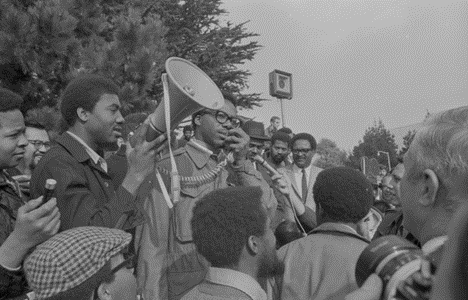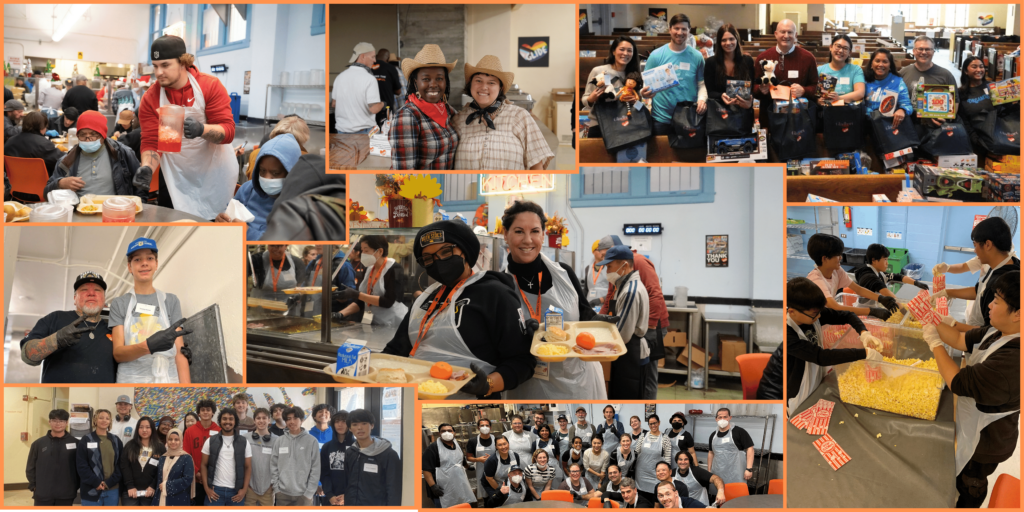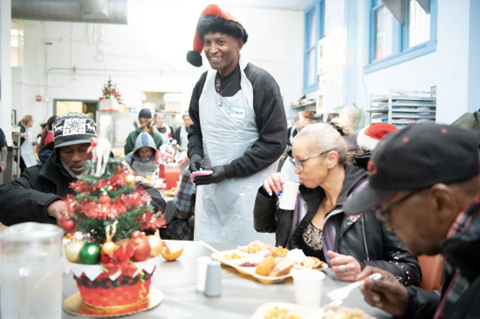Hidden Figures: Recognizing GLIDE’s Black History
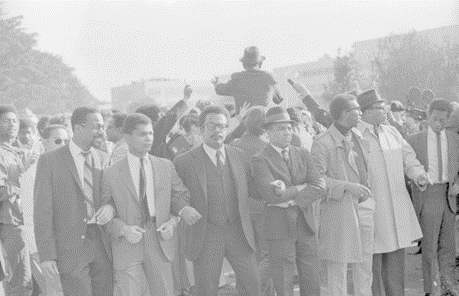
Celebrating GLIDE's History During Black History Month
Welcome back to our monthly volunteer newsletter! This month holds extra significance as we not only celebrate love (Valentines Day) but also Black History and Black Futures Month. Please join me as we take a historical journey into GLIDE’s decade of love. For me it began when I visited GLIDE’s archives, currently being held by the San Francisco Public Library and GLIDE’s Museum co-production with the Tenderloin History Museum.
GLIDE’s historical archives unveiled a treasure trove of knowledge regarding the programming and political actions GLIDE has championed over the past six decades. In this newsletter I will be integrating some of my favorite photos from the archives with our Black History highlights.
As always, please reach out if you have any experiences or volunteers, you would like us to highlight. You can reach us for newsletter inquiries via volteam@glide.org. Please put Volunteer Spotlight in the subject line.
Upcoming Volunteer Opportunities
Daily Free Meals Program
Volunteering with our meals team is one example of how you can make an instant difference in another persons day. Either by serving meals directly to those in need or supporting our chefs in the prep room; you become a part of our larger mission of combatting basic needs insecurity in San Fransisco.
By signing up via our volunteer portal, you make our events possible. Meal service is just one of the many volunteer opportunitys we offer that allow our volunteers to directly engage with and support our local community. For Daily Free Meals Team and all other events, you can visit our shift calendar.
Thank you for supporting GLIDE!
Call for Volunteer Client Surveyors
GLIDE’s Center for Applied Learning (CALI) is looking for volunteers to help with our annual Client Surveys across all our programs. As a volunteer you would play a key role in making sure our client feedback is seen and heard. Spanish, Cantonese, and Vietnamese speakers are especially welcome!
Survey results are used to make key program improvements and ensure they are culturally relevant, impactful, and meeting our community’s needs. Please sign up here.
Supporting Our Community
Historic Spotlight: SFSU Students STRIKE for Ethnic Studies
Throwback Feature: Did you know… that in 1969, GLIDE played a pivotal role in funding the first Black Studies and Ethnic Studies Programs at a university?
In 1968, Cecil Williams and GLIDE congregation members joined the students of San Francisco State University in a historic protest—the longest student-led strike in history. It began as tensions arose at San Francisco State, where students and professors became outspoken against the Vietnam War. This atmosphere of dissent led to George Murray, an instructor and Black Panther member, being dismissed from his teaching position. Murray’s removal was described by KQED as “setting fire to kindling.”
The five-month long strike was led by the Black Student Union and the Third World Liberation Front. The Black Student Union’s demands included establishing a Black Studies Department, an increased admission of Black students, and for Black Professors to be hired and paid fairly. The Third World Liberation Front demanded that the university create a School of Ethnic Studies with appropriate faculty positions, and that all students of color be admitted for the Fall 1969 semester.
After months of protests, in which students and community leaders clashed with police, almost every demand was met. The school admitted nearly all people of color in Fall of 1969, established the Black Studies Program and established the College of Ethnic Studies.
As we reflect on these monumental efforts, I urge us to pay close attention to the struggles our community engaged during the 1960’s especially as leaders in California today advocate for the integration of ethnic students into high schools.
Finding Purpose Through Service
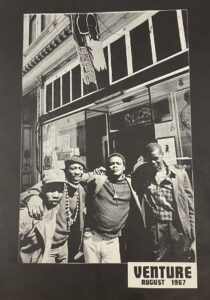
Program Throwback: Black Man’s Free Store
Did you also know … that GLIDE supported the Black Man’s Free Store? In the era of love, GLIDE was the fiscal sponsor of the Black Man’s Free Store, a collective which aimed to uplift the Black community. The free store was established in the Fillmore and focused on distributing food, clothes, furniture, and appliances directly to low-income Black community members.
It began when Roy Ballard, a young Black civil rights organizer and member of the Diggers, pitched the Free Store to a GLIDE intern, Larry Mamiya in 1967. The free store opened in May of that year.
Free Store Volunteers described the free store in a 1968 publication of GLIDE’s monthly newsletter as a place where people can become themselves.
“What is a free store? Its first principle is to give whatever can be obtained to those who will take. This means clothing, furniture, appliances, food. In a ghetto area where physical and emotional needs are critical, where American Opportunity is an outworn joke, where the ravages of racism are as real as the pavement, a free store means revolution. Much more than the distribution of free goods is involved. In the case of the Black People’s Free Store, the fundamental revolutionary function is to communicate love to fellow human beings. With love — feeling, understanding, respect, communication — people are allowed to believe in themselves, to love themselves, to become themselves.”
– Venture, a GLIDE publication
The Black Man’s Free store ran by volunteers became the go-to place for the community to get necessities they needed, no questions asked. This is similar to GLIDE’s operation today where anyone needing services — be it an ID voucher, clothing, a meal or three — can come get it, no questions asked! Our Walk-In Center provides new clothes like coats, socks, or blankets to any community members in need. Additionally, our Harm Reduction Team and our Integrated Service Hub provides direct health resources to our community members.
The organizers of the Black Man’s free Store highlighted that the store is free for everyone, not just Black community members. It was a safe space for sex workers and wayward youth in the Fillmore district. Organizers spoke proudly in their interview for GLIDE’s publication Venture regarding the way the store builds trust among community members. “When a person realizes that he can always get what he needs when he needs it, that the store is not going to empty or disappear in a day or two, he usually begins bringing extra items back, feeling that other people, Iike himself, aIso need. Instead of a maze of fears about acquisition and possession, people find themselves feeling responsibility towards other people.”
In 1969 the free store moved to 689 McAllister Street, and expanded to become the Black Man’s Free Store Medical Clinic. In a 1971 interview with the SF Examiner’s Janet Ellis, a young black clinic volunteer, spoke to the clinic’s ability to “give tests for VD, shots, sickle cell anemia screening” and more. Nobody knows when the Black Man’s free Store & Clinic ended, but articles from the Oakland Tribune from 1973, and an LA Times story from 1975, claim that the program lasted at least six years.
Black Man’s Free Store interviewees spoke about having food available for free for the low income and local sex workers in the Fillmore during their 1968 interview. It was within a year that GLIDE began our Free Meals Program. What began as two meals a week, has grown into our 2,100 meals served to our low-income and homeless community on a daily basis.
From these roots, GLIDE’s programming has grown into the network of support we all know about. Today, someone can come to GLIDE and find a warm meal, clean clothes, unconditional legal aid, health services, and so much more. While the Free Store was a radical act, GLIDE has worked to institutionalize practices like these in our community with our deeply rooted values of transformation and inclusivity.
Thank you again to our Volunteers
Thank you for reading this month’s newsletter. It is engaged volunteers like YOU who make a difference.
You may contact me at Tstapp@glide.org. If you have a story suggestion, please put Volunteer Newsletter Story in the subject line and I will get back to you as soon as possible.
If you would like to donate books to our GLibrary initiative, we appreciate books in new or gently used condition across all genres. You may contact our GLibrarian Waverlee at Wcraig@glide.org with any questions or to coordinate the drop off of materials.

